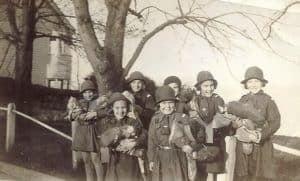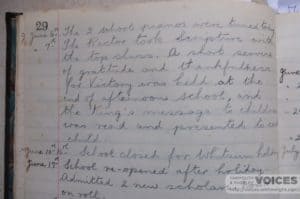Guides and Brownies
The thing I loved most of all when I was young was Guides and Brownies. When I first joined the Brownies, a remarkable lady called Mrs Hans Hamilton was in charge of all Brownie and Guide things. She was Brown Owl and the Guides always called her Madam, as I believe she was also District Commissioner.
Now in those days, each meeting that we had was stopped for a minute or two as she inspected us to see that our uniforms were as near perfect as possible. First you wore a hat. If you had long hair it had to be plaited or tied back off your collar. Ties at that time were made out of a shiny shaped material folded and tied at the back of your neck with a reef knot. The idea of this shaped tie was if someone hurt their arm the tie could be unfolded and used as a sling. Then there was the Brownie or Guide badge made of brass, and they had to be polished until they shone. Belts and shoes had to be polished as well and the shoes had to be black or brown with white socks or brown stockings. May be that seems a lot of fuss now, but we were proud of our uniforms and to make them look smart was a challenge. The Guide and Brownie activities were so numerous it would take for ever to relate them all, but the story I’m now going to tell, I’m doing so in the hope that someone may be able to remember what this occasion was.
There was some sort of parade that took part on Yarmouth Quay. Mary Lord (nee Hayles) and I were told as senior Sixers in the Brownies that we were to be very smart and represent the Brownie pack. I know we lined up with a few Guides and Scouts, Red Cross and all sorts of other people in uniforms. A gent, who I understand was an Admiral, and two other gents walked along the line looking at us. This went on for a long time and when it was at last over, we were taken out to a large Naval boat off the Common. We all stood along the side of the ship when someone blew a whistle. I later found out it was called a Bosun’s whistle. Then a loud voice yelled ‘Muster on the upper deck!’ and everyone moved. Several sailors showed us the way.
Now I thought they said ‘Mustard’, like you eat. I could not make out why they would have this on the deck. I looked around and of course could not see any. So I said to Mary, ‘I can’t see any mustard, can you? Why would they put it on the deck?’
Mary was the daughter of Harold Hayles the boat builder and what Mr Hayles didn’t know about any boat was not worth knowing. Mary said, ‘Don’t be so daft’ and then explained to me what it meant. I did feel daft! Then a lot of talking went on and prayers were said and hymns sung. I can’t remember what happened after this. I think we went home. If anyone has any ideas what this was all about it would be nice to know. My husband Norman thinks it must have been the end of war celebrations, as in the war we would not have been taken out to the ship. If anyone knows about this it would be lovely to hear.
Delia Whitehead nee Hunt b 1934






